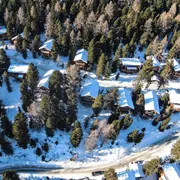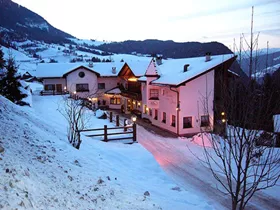
© Telluride ski resort
Colorado’s Boulder County, San Miguel County and the City of Boulder are suing oil and gas giants Suncor Energy and Exxon Mobil for their contributions to climate change over the last half-century. The plaintiffs are arguing that despite knowing the potential impacts of fossil fuel on the environment as early as the 1960’s, they not only continued to sell fossil fuels but also engaged in a massive decades-long disinformation campaign to occult the dangers of greenhouse gas emissions. Among the damages listed are the devastating effects of climate change on the snowpack, especially at the well-known Colorado ski resort of Telluride.
Climate change has reduced snowpack by almost a half, claimants say
According to a 2014 study, Colorado has seen an increase of over 2°F (just over 1°C) since the early 1980’s, and temperatures are expected to keep increasing by up to 5°F (almost 3°C) in the next few decades. All five of the warmest years on record have been since 2010. The temperature rise is already having a noticeable effect on the state’s ski resorts, bringing shorter winters and reducing the snowpack by 30-50%. Worth $5 billion, Colorado’s ski industry is the largest in the country and is famous worldwide for big-name resorts such as Aspen, Breckenridge and Vail. The ski resort of Telluride, in the Rocky Mountains, is actually located within the San Miguel county. Climate change is therefore a very real concern for a state whose economy revolves around snow.
Colorado following in the footsteps of California and New York
In addition to the effects on the snowpack, the claimants are asking Exxon and Suncor to help pay for the damages caused by wildfires, droughts and storms that were exacerbated by climate change. The lawsuit presented by the Colorado communities echoes lawsuits presented in California, Washington and New York, among others. However, this is the first lawsuit of its kind to be presented by a non-coastal US community. The counties of Boulder and San Miguel have put measures in place to reduce their own greenhouse gas emissions but they argue the costs are too high and the problem too big to solve on their own.
Companies show no sign of reducing fossil fuel sales
Exxon Mobil and Suncor both have a huge presence in Colorado: Exxon Mobile’s agent XTO produces 130 million cubic feet of gas per day, and Exxon and Suncor are the joint owners of the largest tar sands in Canada, which produces and sells synthetic crude in Colorado. According to the lawsuit, the companies plan to continue increasing their sales of fossil fuels well into the 21st century.
Brown slopes: Les Deux Alpes webcam on October 24, 2018
Record-low snowfall and warmer winters in the Alps
Meanwhile, in Europe, the Alps are suffering record-low snowfall. Despite a bumper ski season last year, this autumn has been warm and dry. The glacier ski area at Les Deux Alpes doesn’t have enough snow to open for autumn skiing this year and will instead remain open for hiking and mountain biking until November 4th. Tignes also had to briefly postpone its glacier ski area opening and is looking into building an indoor ski slope to mitigate the effects of climate change. Austria is on track to experience one of the warmest years on record. While lawsuits aren't a go-to in Europe like they are in the US, ten families filed suit against the EU this year for climate-change related damages.
© Telluride ski resort
Colorado’s Boulder County, San Miguel County and the City of Boulder are suing oil and gas giants Suncor Energy and Exxon Mobil for their contributions to climate change over the last half-century. The plaintiffs are arguing that despite knowing the potential impacts of fossil fuel on the environment as early as the 1960’s, they not only continued to sell fossil fuels but also engaged in a massive decades-long disinformation campaign to occult the dangers of greenhouse gas emissions. Among the damages listed are the devastating effects of climate change on the snowpack, especially at the well-known Colorado ski resort of Telluride.
Climate change has reduced snowpack by almost a half, claimants say
According to a 2014 study, Colorado has seen an increase of over 2°F (just over 1°C) since the early 1980’s, and temperatures are expected to keep increasing by up to 5°F (almost 3°C) in the next few decades. All five of the warmest years on record have been since 2010. The temperature rise is already having a noticeable effect on the state’s ski resorts, bringing shorter winters and reducing the snowpack by 30-50%. Worth $5 billion, Colorado’s ski industry is the largest in the country and is famous worldwide for big-name resorts such as Aspen, Breckenridge and Vail. The ski resort of Telluride, in the Rocky Mountains, is actually located within the San Miguel county. Climate change is therefore a very real concern for a state whose economy revolves around snow.
Colorado following in the footsteps of California and New York
In addition to the effects on the snowpack, the claimants are asking Exxon and Suncor to help pay for the damages caused by wildfires, droughts and storms that were exacerbated by climate change. The lawsuit presented by the Colorado communities echoes lawsuits presented in California, Washington and New York, among others. However, this is the first lawsuit of its kind to be presented by a non-coastal US community. The counties of Boulder and San Miguel have put measures in place to reduce their own greenhouse gas emissions but they argue the costs are too high and the problem too big to solve on their own.
Companies show no sign of reducing fossil fuel sales
Exxon Mobil and Suncor both have a huge presence in Colorado: Exxon Mobile’s agent XTO produces 130 million cubic feet of gas per day, and Exxon and Suncor are the joint owners of the largest tar sands in Canada, which produces and sells synthetic crude in Colorado. According to the lawsuit, the companies plan to continue increasing their sales of fossil fuels well into the 21st century.
Brown slopes: Les Deux Alpes webcam on October 24, 2018
Record-low snowfall and warmer winters in the Alps
Meanwhile, in Europe, the Alps are suffering record-low snowfall. Despite a bumper ski season last year, this autumn has been warm and dry. The glacier ski area at Les Deux Alpes doesn’t have enough snow to open for autumn skiing this year and will instead remain open for hiking and mountain biking until November 4th. Tignes also had to briefly postpone its glacier ski area opening and is looking into building an indoor ski slope to mitigate the effects of climate change. Austria is on track to experience one of the warmest years on record. While lawsuits aren't a go-to in Europe like they are in the US, ten families filed suit against the EU this year for climate-change related damages.















